Episodes
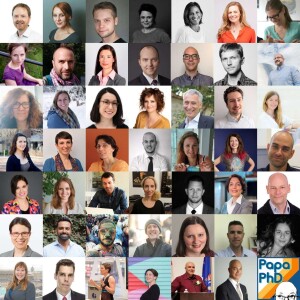
Thursday Jul 30, 2020
Thursday Jul 30, 2020
Download "Tools for Your PhD Journey" Now !
Episode transcript:
Hi there!
We're reaching the end of season one of Papa PhD and today, I just wanted to thank all the listeners out there who've been following the show around the world. It's been quite humbling to see the show grow as it did in this first year, so again, one of the things that I wanted to do today is to thank you, you who are out there thinking about your PhD, about your master’s degree and thinking about what your career can look like in the future. I really hope that the conversations that I've been sharing on the show have inspired you in your journey.
In this first season I’ve had the chance of talking with so many interesting guests and learning with them, and hopefully of sharing enough of their wisdom with you to help you in your life and career exploration.
I feel extremely grateful for having had guests that spanned so many different academic domains: from the life sciences to engineering, to psychology, to literature. The reach of these conversations has by far surpassed what I had imagined was possible when I set out to launch the podcast, so I also want to send out my heartfelt thanks to all the guests who have been on Papa PhD on this first season.
Looking back on all these conversations and thinking of you, the listener who is thinking about your future , about what path to take, about what decisions to make, I feel that one of the common threads having come out of all these conversations, and that is maybe the most important, was allowing yourself to experiment during your graduate degree. Not only within your research, but importantly outside of it. This can take the form of getting involved in student societies, volunteering in outreach projects, being part of communities around sports or creativity, but also of internships in industry or of taking breaks where you try something completely different before embarking on a new chapter of your academic life.
Another common thread that I feel is very important has to do with how you perceive yourself as an academic, as a researcher, as a candidate for a job. Coming out of graduate school you may not be aware of a few important skills you have developed, but that are not technical, that don't have to do directly with your subject matter. One of the very important skills that you develop by writing a master’s or PhD thesis is your capacity to analyze, digest, and make sense of large sets of complex data. Hand in hand with this is your capacity for problem solving. And these are skills that are highly prized by employers.
Another area where you organically developed skills during your degree is project management. A lot of positions out there in the job market require the capacity to take on large projects, complex projects, and be able to plan, set milestones, define goals, and then work towards reaching those goals. This is another of the aspects that have again and again being mentioned by guests on the show.
If you listen back to the different episodes, to the different interviews, you will find more of these skills, to do with the specific domain each guest works in currently. So, go and explore the Season 1 interviews, listen to the guests who are working in a domain that interests you. You'll see, you'll find advice you can use to start building a plan for yourself.
Now, a lot was told during season one about transferable skills, but a lot also was told about the blind spots, the things you don't naturally come out of graduate school knowing and being prepared for. One of the main ones has to do with preparing your CV and preparing to interview in a non-academic setting.
If you listen back to the interviews were spoke about jobhunting and interviewing outside of academia the main advice that came up again and again was to tailor your CV to each potential employer and, specifically, to give emphasis to the soft skills you have accrued while performing your research and keeping to a mi...
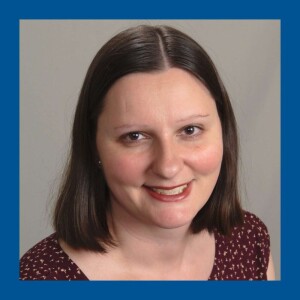
Wednesday Jul 22, 2020
Wednesday Jul 22, 2020
This is the third and last part of the special series on science communication during the COVID-19 pandemic.
The world is still very much fighting and trying to understand the COVID-19 pandemic at the moment this episode is airing, so I am bringing you the interventions of my guests on a panel that took place in May, titled "Scientists and the News Cycle – What Role Can We Play?"
In this third part, I discuss with Mónica Feliú-Mójer, Ph.D., with Joana Lobo Antunes, and with Adriana Bankston about how governments have been dealing with the pandemic and specifically about what role the interface between goverments and the scientific community can inform decision making and lead to better outcomes.
Another very interesting conversation about a subject that often takes the backstage
#gallery-3 {
margin: auto;
}
#gallery-3 .gallery-item {
float: left;
margin-top: 10px;
text-align: center;
width: 33%;
}
#gallery-3 img {
border: 2px solid #cfcfcf;
}
#gallery-3 .gallery-caption {
margin-left: 0;
}
/* see gallery_shortcode() in wp-includes/media.php */
Adriana Bankston, PhD
Joana Lobo Antunes, PhD
Mónica Feliú-Mójer, PhD
Episode transcript:
David Mendes: I think a lot of very important things are being shared around the table, and I hope that people that are on the live, on Facebook, are appreciating that, too. I see little hearts popping up on the Facebook page, so I think it's a good sign. Now, in this part, I've named it "Can Policies Tip the Scales" and my first question is for Adriana: apart from universities and scientific societies and organizations like we've talked up till now, could governments also – and we, all around the table, know the answer to this, and we've even said that only governments can – be the final decider in the end? From your position of being in DC, what does that engagement look like from the federal point of view? What have you seen in terms of, initiatives, programs that have been making a difference ever since the crisis started?
Adriana Bankston: I think a lot of this comes down to funding.
So, governments can support universities and also other entities that relate to research and education. There have been bills and supplements coming out, multiple ones around supporting COVID-19 research, vaccines, testing, community events, a lot of different angles of this. And I think if we're talking about policy makers specifically, obviously they're busy people, they have a lot of priorities, they have, you know, as I said, they like to hear from constituents, they have the ability to appropriate funds for research and so on. So I think a lot of this, sort of the engagement from the government and policy side has been to hear the advocacy that comes in around the COVID issues and also financially supporting universities.
David Mendes: Now, I had the chance of listening to a conversation that Joana had in Portugal, in Portuguese, not so long ag, and Joana talked about what's been happening in Portugal and how government has been doing there in managing the crisis at the pandemic.
So, Joana, I heard you mention that Portuguese government has done a very good job in terms of taking decisions and implementing measures based on the input of specialists and of scientists from the medical and scientific community. Can you share with us what you think worked well in the Portuguese case, so far, and why?
Joana Lobo Antunes: Yeah, well, we are extremely fortunate and we are grateful because as you know, in Europe, we are usually paired more with Italy and France and Spain than with Denmark or Austria, and we actually have numbers more similar to those countries than to the Latin ones. And one of the key factors here was that government listened to scientists and they promoted the lockdown early – the other countries locked down much later. When the government in Portugal locked down,
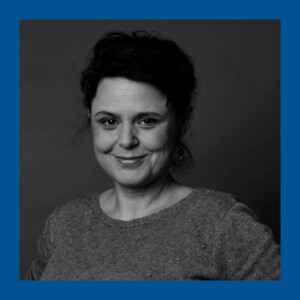
Wednesday Jul 15, 2020
Wednesday Jul 15, 2020
This is the second of a 3-part series that will close the first season of Papa PhD.
The world is still very much fighting and trying to understand the COVID-19 pandemic at the moment this episode is airing, so I am bringing you the interventions of my guests on a panel that took place in May, titled "Scientists and the News Cycle – What Role Can We Play?"
In this second part, I discuss with Mónica Feliú-Mójer, Ph.D., with Joana Lobo Antunes, and with Adriana Bankston about how to connect with your audience during the COVID-19 crisis, and about what their views are on how the scientific community as a whole can engage in this conversation, at the community level and at the government and policy level.
Part 3, coming up next week, will focus on the what is happening on the science policy side, and on how you, and the scientific community can be heard and contribute to the efforts that are already ongoing.
#gallery-3 {
margin: auto;
}
#gallery-3 .gallery-item {
float: left;
margin-top: 10px;
text-align: center;
width: 33%;
}
#gallery-3 img {
border: 2px solid #cfcfcf;
}
#gallery-3 .gallery-caption {
margin-left: 0;
}
/* see gallery_shortcode() in wp-includes/media.php */
Adriana Bankston, PhD
Joana Lobo Antunes, PhD
Mónica Feliú-Mójer, PhD
Episode transcript:
David Mendes: These last few weeks have seen the surfacing of a host of fake news, misinformed statements by government leaders, conspiracy theories, that have fostered movements of COVID skepticism and resistance to health and safety guidelines.
And, One of the obstacles, of course, one of the things, of course, is to make sure that the news, the right news, the true news are out there and have the spotlight, but there's also the question of bringing the message to the public in a language and in a way that talks to them, right? And that will reach them intellectually and emotionally, and that will make them act upon what they heard. Monica, the question is for you – based on your experience on the ground, and you've already alluded to it a little bit, because you said that the governor was making a statement that was totally not science-based. The question is how well has the scientific community been able to push back against misinformation that's been surfacing about the coronavirus and COVID-19 and, given the problems you've identified and you're dealing with in Puerto Rico, how can scientists develop and deploy culturally appropriate solutions in this context?
Mónica Feliú-Mójer: In Puerto Rico, the scientific community has been incredibly active and engaged in communicating the, the science and the implications and different sectors of society of COVID 19. We're trying our best to address misinformation, but, you know, I can't compete with the secretary of health – that's the person you were thinking about – you know, his platform is way bigger than mine. And so, while we're doing our best, I think in terms of the expressions and the comments he made, that the damage is done. That once misinformation is out there it's hard to combat because people become familiar with it, and so it's a tricky thing to do.
However, we've been very active. I will say I have been really encouraged by the visibility that scientists, in Puerto Rico – you know, that's, my experience is predominantly in Puerto Rico – that scientists have, you know, I never thought I would hear a government official talk about PCRs, pretty much every day. You know, I'm talking about PCRs multiple times a day in the media, and so I think there are some encouraging signs and opportunities in terms of the visibility of scientists, in terms of – people want to hear from scientists. In Puerto Rico, I mentioned there is a lack of credibility in the government, and although we don't really have surveys that tell us the population in Puerto Rico trust in science,
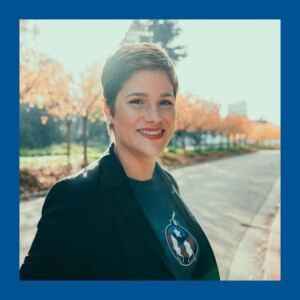
Wednesday Jul 08, 2020
Wednesday Jul 08, 2020
This is the first of a 3-part series that will close the first season of Papa PhD.
The world is still very much fighting and trying to understand the COVID-19 pandemic at the moment this episode is airing, so I am bringing you the interventions of my guests on a panel that took place in May, titled "Scientists and the News Cycle – What Role Can We Play?"
In this first part, I talked with Monica Feliu-Mojer, Ph.D., with Joana Lobo Antunes, and with Adriana Bankston about the impact the pandemic has had on their professional lives and on the lessons they have learned, so far.
Part 2, coming up next week, will focus on the role academic institutions and scientific associations can play, in terms of science communication, in a context such as the ongoing pandemic.
#gallery-3 {
margin: auto;
}
#gallery-3 .gallery-item {
float: left;
margin-top: 10px;
text-align: center;
width: 33%;
}
#gallery-3 img {
border: 2px solid #cfcfcf;
}
#gallery-3 .gallery-caption {
margin-left: 0;
}
/* see gallery_shortcode() in wp-includes/media.php */
Adriana Bankston, PhD
Joana Lobo Antunes, PhD
Mónica Feliú-Mójer, PhD
Episode transcript:
David Mendes: Welcome everyone here. I’m super happy to be here today, discussing the role of the scientific community in today’s, situation, which is the COVID pandemic. We’re going to talk about all the challenges that society and the scientific community has faced during this crisis and what solutions, also have been, working so far. What hasn’t been working and at different levels. I’m going to start by reading a little introduction and then I’ll also introduce the guests who are here.
In the wake of the worldwide spread of SARS-CoV-2, these last few weeks have seen world leaders sending out mixed messages and trying to trace a path on a moving terrain with questions like social distancing, wearing of masks, and lockdown.
On another front, while doctors, epidemiologists and virologists have been working around the clock to understand COVID-19 and take control of the pandemic, and to advise politicians and policy deciders, we’ve seen a movement of disinformation and conspiracy theories that has been gaining traction and visibility with video content circulating and passing on fake news that is tricking the general public into lending it a credibility that it doesn’t deserve.
In our live discussion today, we are going to talk about the challenges this pandemic has faced the scientific community with, we are going to discuss what role researchers and the scientific community at large can play during a world crisis, such as this one and we are going to try and get a wide-angle view of how the scientific community has been impacted at the policy level, at the level of universities and at the community level.
To discuss these issues today I have with me Dr. Adrianna Bankston, Dr. Joana Lobo Antunes and Dr. Mónica Feliú-Mójer. Dr. Adriana Bankston is a principal legislative analyst at the University of California Office of federal governmental relations in Washington, DC. Prior to this position, she was a policy and advocacy fellow at the society for neuroscience where she provided staff support for special and ongoing projects, including SFN’s annual lobby event and the society’s annual meeting. In addition to working at UC, Adriana also serves as the director of communications and outreach for the journal of science policy and governance—JSPG—and is an associate member of the public policy committee with the American society for cell biology.
For the past several years, Adriana has also been an active member in the nonprofit organization Future of Research, where she’s currently the vice president and has previously served as the associate director of fundraising and strategic initiatives. Adriana received her bachelor’s in biological sciences from Clemson University and her PhD in biochemistry,

Thursday Jul 02, 2020
Thursday Jul 02, 2020
In part 2 of my conversation with Graydon Snider, we dug a little deeper into his rationale for exploring career avenues during his postdoc. The strategies and resources he used, the people he met, the notes he took. I also took the opportunity to ask Graydon what the day-to-day of a data scientist looks like today and how to prepare if you want to access this flourishing domain.
Graydon grew up in Ottawa, then moved to Montreal for graduate school for a PhD in chemistry at McGill University, moving to Halifax for work as post doc at Dalhousie University, and finally came back to Montreal where he currently works at SSENSE as a Data Scientist. Formerly a student of atmospheric chemistry, Graydon carried an interest in numbers between various pursuits. His hobbies include running and juggling, occasionally at the same time.
Join the Papa PhD Postgraduate Career Exploration Group!
What you’ll learn about in this episode:
How having informational interviews and collecting narratives of people from your domain who have transitioned out of academia can help you find your path
What you need to unlearn when preparing to interview for a position in industry
The importance of networking and of showing up for events where you might meet people with whom to discuss your professional future
Taking advantage of online training platforms to get your programming skills up to speed
Why you should look for career-related training and seminars in your university
A good starting point for data analysis and programming: R
This episode’s pearls of wisdom:
“The three things that you would want to emphasize in an interview that academic institutions don't teach you by default are: #1 is most interviews end up being "do I want to work with this person"; right under #1 is #2, which is "do they have the specific skills" but that's something you've lost control of. You do have more control over showing how you can network.”
“Learn how to apply to places that you didn't think about, necessarily, initially. What I mean is don't go with the most obvious choice. I fell into this trap myself. Even with all these skills and everything, I was still thinking about chemistry. Why not just apply to all kind of institutions? Big companies have all kinds of special positions like data science.”
Graydon's links: LinkedIn – Linkedin.com/in/GraydonSnider.; Medium.com/Ssense-tech
Leave a review on Podchaser !
Support the show on Patreon !
You might also like the following episodes:
Jonathan Weitzman – Academic Mentoring: PapaPhD.com/48; PapaPhD.com/49
Maryse Thomas – Science Communication: PapaPhD.com/52;PapaPhD.com/53
Nathalie Ross – Medical Writing: PapaPhD.com/50; PapaPhD.com/51
Zoë Ayres – Water Industry: PapaPhD.com/54; PapaPhD.com/55
Launching your podcast?
If you're preparing to launch your podcast, you may be asking yourself what hosting platform to use.
I launched Papa PhD on Bluebrry because I wanted a professional service that would interface with my WordPress website, that would robustly broadcast Papa PhD to all platforms, and that would allow me to grow my podcast in years to come.
And these are the reasons why I'm recommending the Blubrry podcast hosting and syndication platform.
Click on the button below or use the promo code PapaPhDBlue on the Blubrry website to unlock a one month free trial:
Try one free month with Blubrry !
If you are starting a serious podcast project, do consider one of the first podcasting hosts out there, offering state of the art services, including IAB certified statistics, based on years of experience in the podcasting space.
Happy podcasting!
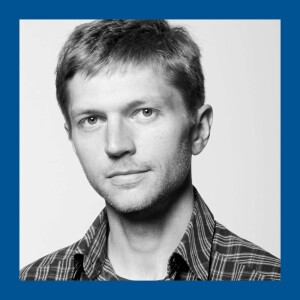
Wednesday Jul 01, 2020
Wednesday Jul 01, 2020
Do you know what it means to be a data scientist? This domain that is attracting more and more PhDs is fairly new, and looking at the job postings out there, it might be difficult to understand exactly what the requirements are and what the job entails. This week you’ll be hearing about Graydon Snider’s journey, from a PhD and postdoc in atmospheric chemistry to a data scientist position in a fashion retail company. With him I’ll try to paint a clearer picture of what being a data scientist means, and of how to prepare yourself to become one.
Graydon grew up in Ottawa, then moved to Montreal for graduate school for a PhD in chemistry at McGill University, moving to Halifax for work as post doc at Dalhousie University, and finally came back to Montreal where he currently works at SSENSE as a Data Scientist. Formerly a student of atmospheric chemistry, Graydon carried an interest in numbers between various pursuits. His hobbies include running and juggling, occasionally at the same time.
Join the Papa PhD Postgraduate Career Exploration Group!
What you’ll learn about in this episode:
You can adapt your academic path to your life goals at the different turning points – Graydon broadened his horizons at the postdoc after feeling too specialized at the end of his PhD
The importance of taking part in activities and having a community outside of research, for your physical and mental health
Blogging as a simple way to develop and express your other interests
During graduate school or in your postdoc there are other researchers around you, your peers, asking themselves the same questions you are - talk to them and think about these questions together
Why you should take part in (or organize) career seminars with guests from different domains
This episode’s pearls of wisdom:
“One of the things I took a step back to assess was how my interests could translate to other things, so what have I learned so far that would be useful in another field. One of those was numbers themselves, my interest in data – analyzing data, looking at data in the field, in the real world, summarizing it. That sort of thing was broadly of interest to me.”
“To have that sort of community of people that kind of give you a sanity check when work is not going as planned or you just need an outlet. It doesn't have to be at any particular caliber. It's just the goal of having this other group that you associate with outside of work. Because academia is dangerous for – you mix your free time and your spare time with your work time and they become blurred.”
Graydon's links: LinkedIn – Linkedin.com/in/GraydonSnider.; Medium.com/Ssense-tech
Leave a review on Podchaser !
Support the show on Patreon !
You might also like the following episodes:
Jonathan Weitzman – Academic Mentoring: PapaPhD.com/48; PapaPhD.com/49
Maryse Thomas – Science Communication: PapaPhD.com/52;PapaPhD.com/53
Nathalie Ross – Medical Writing: PapaPhD.com/50; PapaPhD.com/51
Zoë Ayres – Water Industry: PapaPhD.com/54; PapaPhD.com/55
Launching your podcast?
If you're preparing to launch your podcast, you may be asking yourself what hosting platform to use.
I launched Papa PhD on Bluebrry because I wanted a professional service that would interface with my WordPress website, that would robustly broadcast Papa PhD to all platforms, and that would allow me to grow my podcast in years to come.
And these are the reasons why I'm recommending the Blubrry podcast hosting and syndication platform.
Click on the button below or use the promo code PapaPhDBlue on the Blubrry website to unlock a one month free trial:
Try one free month with Blubrry !
If you are starting a serious podcast project, do consider one of the first podcasting hosts out there, offering state of the art services, including IAB certified statistics, based on years of experience in the podcasting space.
Happy podcasting!

Thursday Jun 25, 2020
Thursday Jun 25, 2020
Dans cette deuxième partie de ma conversation avec Jean-Sébastien Provost, on a parlé du chapitre postdoc de son trajet académique et de comment celui-ci l'a propulsé vers la carrière de scientifique des données. On a ensuite plongé dans la question de ce qu'est que la science des données et de comment accéder à ce domaine après les études de troisième cycle.
Jean-Sébastien Provost détient un doctorat en science biomédicale de l'Université de Montréal. Plus précisément, il a étudié la contribution des régions fronto-striatales dans les processus exécutifs en utilisant l'imagerie par résonance magnétique fonctionnelle. Après un postdoctorat et 3 années à travailler comme associé de recherche, il a fait le grand saut dans le milieu de l'industrie en tant que scientifique des données. De plus, il travaille aussi en tant que mentor afin de guider les futurs scientifiques des données dans l'acquisition des connaissances et des aptitudes nécessaires et dans leur préparation aux entrevues, afin de leur permettre d'obtenir un emploi le plus rapidement possible.
Joignez-vous au groupe d'exploration de carrières Papa PhD !
Ce que vous apprendrez dans cet épisode :
L'intérêt de postuler et de mener ses études de troisième cycle dans une plus petite université
Combien rencontrer et parler avec des gens dans votre réseau peut être important pour vous ouvrir les horizons et même pour vous ouvrir des portes vers des emplois potentiels
Les cours en ligne comme outil pour acquérir les connaissances et habiletés qui vous manquent pour le poste que vous désirez
L'importance de faire une recherche des différentes offres d'emploi pour comprendre ce que chaque employeur cherche, car la définition de scientifique des données peut changer considérablement
Une définition générale de ce que font les scientifiques des données et un survol des principaux outils qu'ils utilisent au jour-le-jour
Les perles de sagesse de Jean-Sébastien :
« J'ai vu des candidats qui ont fait des doctorats ou des études graduées dans des universités qui étaient, peut-être, des plus petites universités, mais si le projet de recherche est bien fait, si le projet de recherche est solide, mais si la personne est capable de le vendre correctement, il n'y a aucune raison qu'on ne soit pas capable de vendre ce qu'on a fait pour avoir un postdoc dans une bonne université. »
« J'avais toujours dans l'optique que je voulais devenir professeur bien que j'avais toujours eu un doute. Et c'est ça qui est un peu fâchant : c'est que même quand j'étais au doctorat j'avais toujours le doute – "est-ce que c'est vraiment ça que je veux faire ?" Puis on nous enseigne que c'est pas mal juste ça qu'on peut faire, donc peu importe, on se dit que c'est ça qu'on va faire. Don après ça, quand je n'ai pas eu mon financement, au postdoc, je me suis dit "est-ce que c'est vraiment ça que je veux faire ?" Là, je me disais "Ah... c'est juste moi qui a peur, fait que non, c'est ça que je veux faire." Puis, quand j'étais revenu à Montréal, j'avais commencé à faire des demandes pour faire un autre postdoc. »
Les liens de Jean-Sébastien : Linkedin – Linkedin.com/in/jean-sebastien-provost; Datasciencedreamjob.com; Kaggle.com.
Laissez une évaluation sur Podchaser !
Soutenez Papa PhD sur Patreon !
Vous aimerez aussi ces épisodes :
Boîte à outils pour les études doctorales – Mon cheminement : PapaPhD.com/37
Carine Monat – Journalisme scientifique : PapaPhD.com/40
Olivier Hernandez – Vulgarisation Scientifique : PapaPhD.com/56; PapaphD.com/45
Virginie Levasseur – Développement international : PapaPhD.com/17
Envie de lancer un podcast?
Mon ami et collègue podcasteur Marco Bernard et son Académie du Podcast ont ce qu'il vous faut si vous avez une idée, mais qu'il vous manque les connaissances pour mettre en place votre podcast.
Dans la formation Podcasting 101, Marco a préparé plus de 20 vidéos et des tutoriels où il explique quel équipement se procurer,
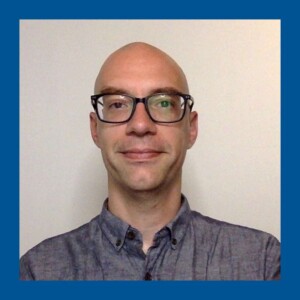
Thursday Jun 25, 2020
Thursday Jun 25, 2020
Cette semaine, je vous apporte une entrevue à propos d'un domaine où les détenteurs de doctorats en sciences sont très en demande - la science des données. Pour en parler, j'ai eu le plaisir d'avoir à mon micro Jean-Sébastien Provost, docteur en sciences biomédicales.
Jean-Sébastien Provost détient un doctorat en science biomédicale de l'Université de Montréal. Plus précisément, il a étudié la contribution des régions fronto-striatales dans les processus exécutifs en utilisant l'imagerie par résonance magnétique fonctionnelle. Après un postdoctorat et 3 années à travailler comme associé de recherche, il a fait le grand saut dans le milieu de l'industrie en tant que scientifique des données. De plus, il travaille aussi en tant que mentor afin de guider les futurs scientifiques des données dans l'acquisition des connaissances et des aptitudes nécessaires et dans leur préparation aux entrevues, afin de leur permettre d'obtenir un emploi le plus rapidement possible.
Joignez-vous au groupe d'exploration de carrières Papa PhD !
Ce que vous apprendrez dans cet épisode :
Il n'est jamais trop tard pour retourner aux études et pour se réorienter
Ce qu'on retire du fait de terminer son doctorat
L'importance de se donner le temps d'être prêt lorsqu'on prend des décisions importantes
L'intérêt de trouver un groupe de recherche et un superviseur qui soient familiers avec le milieu de l'industrie
Pourquoi certains employeurs recherchent des candidats ayant un doctorat
Les perles de sagesse de Jean-Sébastien :
« C'est ça qui est fascinant – c'est que tout le monde qui a fait un PhD, en quelque sorte, se retrouve, à un moment donné, à se poser la question "est-ce que je veux continuer en milieu académique ? Sinon, qu'est-ce que je fais ?" Puis, la majorité du temps, s'ils n'ont pas eu la chance de se retrouver dans un milieu comme ça, eh bien, ils vont se retrouver dans le même questionnement que j'ai eu qui est, probablement, le même questionnement dans lequel 90 % des gens qui ont fait un doctorat se retrouvent Donc lorsque tu leur demandes "est-ce que ça serait d'accord si ou pouvait avoir une conversation", habituellement ils disent "Oui, parce que je sais ce que tu vis et oui, je peux te donner un coup de main." »
« Malheureusement, ça, aussi, c'est quelque chose qui est promu et qui est faux, c'est que ce n'est pas un échec, de ne pas continuer dans le milieu académique. Le milieu académique, c'est une voie. C'est juste qu'on ne sait pas qu'il y a d'autres voies ou, du moins, on est moins familier avec les autres voies. »
Les liens de Jean-Sébastien : Linkedin – Linkedin.com/in/jean-sebastien-provost; Datasciencedreamjob.com; Kaggle.com.
Laissez une évaluation sur Podchaser !
Soutenez Papa PhD sur Patreon !
Vous aimerez aussi ces épisodes :
Boîte à outils pour les études doctorales – Mon cheminement : PapaPhD.com/37
Carine Monat – Journalisme scientifique : PapaPhD.com/40
Olivier Hernandez – Vulgarisation Scientifique : PapaPhD.com/56; PapaphD.com/45
Virginie Levasseur – Développement international : PapaPhD.com/17
Envie de lancer un podcast?
Mon ami et collègue podcasteur Marco Bernard et son Académie du Podcast ont ce qu'il vous faut si vous avez une idée, mais qu'il vous manque les connaissances pour mettre en place votre podcast.
Dans la formation Podcasting 101, Marco a préparé plus de 20 vidéos et des tutoriels où il explique quel équipement se procurer, comment faire le montage et comment le mettre en ondes sur les principales plateformes. Cliquez maintenant pour vous inscrire et avoir accès à la communauté !
Formation Podcasting 101 de l'Académie du Podcast
Dans la formation Podcaster Pro, il a pensé aux professionnels et créateurs qui non seulement veulent lancer leur podcast, mais ont des objectifs précis à atteindre avec celui-ci. C'est en pensant à eux qu'il a préparé plus de 80 vidéos et des tutoriels où il explique non seulement comment lancer son podcast,

Thursday Jun 18, 2020
Thursday Jun 18, 2020
In part 2 of this week's interview, Athina Zampara tells her story of investing in learning as an adult and of building her CV to eventually find a position in the European Commission, where she now oversees projects offering support to PhDs and researchers around the globe.Athina Zampara comes from Greece and has lived and worked in Brussels, Belgium, for 10 years. Athina has an interdisciplinary educational background having studied Physics, History and Philosophy of Science, Italian language and Education. She has worked as Project Manager and now holds a position as Project Officer in the European Public Administration.Note: The views expressed in this interview are purely those of my guest and may not in any circumstances be regarded as stating an official position of the European Commission.
Join the Papa PhD Postgraduate Career Exploration Group!
What you’ll learn about in this episode:
What the Marie Slodowka-Curie Actions does and what role Athina plays within the organizationThe difference between the roles of a project manager and a project officerThe fulfillment Athina gets from being able to see the results of the programs she works on and the impact this has on the individual researchersThe paths to a job in the European Commission for people with advanced degreesHow leveraging information that is online can help you map your skills against jobs that interest youThe general structure of the hiring process for the European Commission and how to prepareThis episode’s pearls of wisdom:“When I go to the projects and I discuss with the young researchers, I tell them "Look, what are the skills that you are going to have from this? It's not only the research, the specific scientific knowledge that you are going to learn, but it is: you learn how to work in a collaborative environment, you learn networking, you learn negotiation, you learn project management. So you learn many, many things that you can say to an employer in the future in order to make them understand that woul will be a good employee.”“There are many resources on the internet where people can look and map themselves on these skills. And they can understand better, also for themselves, what they can do. And then, if they understand, they can explain it to the employers.”Athina's links: LinkedIn – LinkedIn.com/in/Athina-Zampara; Twitter – @LifeOfaPOinEU; Marie Skłodowska-Curie actions, European Commission – ec.europa.eu/research/mariecurieactions/node_en.
Leave a review on Podchaser !
Support the show on Patreon !
You might also like the following episodes:
Adriana Bankston – Science Policy: PapaPhD.com/12Jonathan Weitzman – Professorship and Industry: PapaPhD.com/46Rob Hutcheson – Health Economics: PapaPhD.com/4Simon Moore – Postdoc to Industry: PapaPhD.com/18
Launching your podcast?
If you're preparing to launch your podcast, you may be asking yourself what hosting platform to use.
I launched Papa PhD on Bluebrry because I wanted a professional service that would interface with my WordPress website, that would robustly broadcast Papa PhD to all platforms, and that would allow me to grow my podcast in years to come.
And these are the reasons why I'm recommending the Blubrry podcast hosting and syndication platform.
Click on the button below or use the promo code PapaPhDBlue on the Blubrry website to unlock a one month free trial:
Try one free month with Blubrry !
If you are starting a serious podcast project, do consider one of the first podcasting hosts out there, offering state of the art services, including IAB certified statistics, based on years of experience in the podcasting space.
Happy podcasting!

Wednesday Jun 17, 2020
Wednesday Jun 17, 2020
In this week’s episode, you’ll be hearing about gender bias in academia, about the experience of being a first-generation graduate student, and about the daunting question of “is it OK to quit your PhD?” This week’s guest will also talk about her career journey leading to a Project Officer position in the European Commission.Athina Zampara comes from Greece and has lived and worked in Brussels, Belgium, for 10 years. Athina has an interdisciplinary educational background having studied Physics, History and Philosophy of Science, Italian language and Education. She has worked as Project Manager and now holds a position as Project Officer in the European Public Administration.Note: The views expressed in this interview are purely those of my guest and may not in any circumstances be regarded as stating an official position of the European Commission.
Join the Papa PhD Postgraduate Career Exploration Group!
What you’ll learn about in this episode:
It is ok to stop your degree if it's not a good fit for youWhat it was like to be a first-generation woman in graduate school in the 1990sThe challenges of being a first-generation graduate studentThe importance of choosing a path that meets your personal needsThe ressources and communities that exist today at your university, but also online communities like academic TwitterWhy your graduate school experience is a great springboard towards a career in project managementThe importance of giving priority to your mental health whenever you feel it's being negatively affected by your workThis episode’s pearls of wisdom:“You can be whatever. Independently of your studies you can always do project management. And also, I find it very fulfilling because I can use my analytical skills there. You know, putting pieces at their place and making a jigsaw – it's something that soothes my mind, I would say.”“To tell you the truth, I do have something that eats me inside, that I didn't finish my PhD. I have to say that because I like to finish what I start, there is a feeling of failure, this feeling that something was left and was not accomplished. It will always be there. But the thing is that one has to do what is good for him at the specific moments of choice. That was the good thing that I had to do for myself at the time, also taking into account my mental state, which is also another thing that is very important and is something that people look at in academia, right now – the mental health of people, which is very important.”Athina's links: LinkedIn – LinkedIn.com/in/Athina-Zampara; Twitter – @LifeOfaPOinEU; Marie Skłodowska-Curie actions, European Commission – ec.europa.eu/research/mariecurieactions/node_en.
Leave a review on Podchaser !
Support the show on Patreon !
You might also like the following episodes:
Adriana Bankston – Science Policy: PapaPhD.com/12Jonathan Weitzman – Professorship and Industry: PapaPhD.com/46Rob Hutcheson – Health Economics: PapaPhD.com/4Simon Moore – Postdoc to Industry: PapaPhD.com/18
Launching your podcast?
If you're preparing to launch your podcast, you may be asking yourself what hosting platform to use.
I launched Papa PhD on Bluebrry because I wanted a professional service that would interface with my WordPress website, that would robustly broadcast Papa PhD to all platforms, and that would allow me to grow my podcast in years to come.
And these are the reasons why I'm recommending the Blubrry podcast hosting and syndication platform.
Click on the button below or use the promo code PapaPhDBlue on the Blubrry website to unlock a one month free trial:
Try one free month with Blubrry !
If you are starting a serious podcast project, do consider one of the first podcasting hosts out there, offering state of the art services, including IAB certified statistics, based on years of experience in the podcasting space.
Happy podcasting!
